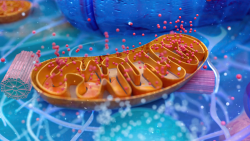One of the more common questions regarding vitamin D supplementation is whether or not to supplement with vitamin K also. In this post, I will address those questions as well as look into the roles of these vitamins in mitochondrial function.
If you recall your high school chemistry, mitochondria are the powerhouses of our cells. Their production of cellular energy, or adenosine triphosphate (ATP), depends primarily upon fuel derived from nutrients including vitamins D3 and K2. These two nutrients are co-factors, or partners, synergistically ensuring strong bones and teeth as well as a cardiovascular system void of lingering, plaque-induced calcium.
Why Is Vitamin D3 Important?
Adequate vitamin D3 is essential to our health and quality of life. Every cell in our body contains a vitamin D receptor (VDR). When a VDR is activated by a sufficient intake of vitamin D3, a number of good things happen. Vitamin D3’s mechanisms of action include: anti-microbial, anti-cancer, and anti-inflammatory. Moreover, scientific research suggests that vitamin D3 deficiency is connected to a wide array of serious medical conditions such as cancer, diabetes, mental health disorders as well as multiple sclerosis and other autoimmune diseases.
Due to our modern lifestyles and conventional medical practices, we tend to get little vitamin D3 from its natural source, the ultraviolet B, or UVB, light of the sun. From living, commuting, and working indoors to fretfully slapping sunscreen all over our skin, we appear intent on denying ourselves this essential nutrient.
The re-emergence in the twenty-first century of rickets, a Victorian-era disease causing soft bones primarily in children, calls to action the need for adequate vitamin D3 supplementation. As most diets are severely lacking in vitamin D3, the most practical way of getting adequate amounts of this nutrient is by taking an inexpensive daily, oral D3 supplement. My Facebook support group called “Vitamin D Wellness” provides information about an easy-to-follow protocol designed to increase D3 levels to an optimal value of 100 ng/mL (250 nmol/L).
The Importance of Vitamin K
Before discussing vitamin K2, I would be remiss if I did not mention the first form of vitamin K. Vitamin K1 is literally a vital nutrient. Without vitamin K1 our blood would not clot, and we could bleed to death. The good news is that vitamin K1 (or phylloquinone) is present in all green plants that acquire energy from sunlight. Green leafy vegetables including spinach, kale, collards, broccoli, and brussel sprouts abound with vitamin K1. Better news: vitamin K1 constantly recycles in our bodies so deficiency is rare.
Vitamin K2 (or menaquinone) however differs greatly from K1. There are two forms of vitamin K2: menaquinone-4 (MK-4) found in grass-fed animal protein including meat, egg yolk, butter, some cheeses, and calf’s liver.
A fermented soybean called natto, commonly consumed in Japan, is abundant in the more potent form of vitamin K2 called menaquinone-7 (MK-7). For those who do not want to consume soy, vitamins K2 MK-7 supplements made from chickpeas and formulated with coconut oil are readily available. My Facebook group protocol “Vitamin D Wellness” includes guidance on K2 MK-7 supplementation.
Health benefits of adequate vitamin K2 levels include potential prevention of osteoporosis, arterial plaque, and dental issues. Vitamin K2 moves calcium to the bones and teeth, as well as sweeps calcium from soft tissue lining such as arteries. Specifically, vitamin K2 activates proteins (osteocalcin and matrix gla protein) produced by vitamin D3 that facilitate moving calcium to where it belongs: the bones and teeth.
Low vitamin K2 levels are common. First, unlike vitamin K1, vitamin K2 is not recycled in the body. Second, the vitamin’s natural sources are lacking in most diets. Owing to the preponderance of industrial farming in many parts of the world, many people are low in vitamin K2. When insufficient vitamin K2 is in the blood stream, calcium can linger along arterial pathways potentially causing calcification, the process whereby calcium deposits form plaque accumulating in the cardiovascular system. These calcium deposits can cause heart disease.
The Vitality of Vitamins D3 and K2
Specific research on vitamin D3 and vitamin K2’s association with mitochondrial function remains limited yet fruitful:
Published in a 2013 issue of the Journal of Clinical Endocrinology and Metabolism, a Newcastle-upon-Tyne University, UK study led by Dr. Akash Sinha demonstrated, for the first time, a connection between vitamin D3 intake and mitochondria function in human skeletal muscles. Sinha and his team concluded that muscle function, including muscle fatigue, improved with vitamin D3 supplementation.
The positive effect of vitamin K2 on apoptosis, or natural cell death, in various types of cancer cells has been established. For example, researchers in China discovered the apoptotic influence of vitamin K2 on bladder cancer cells through mitochondrial pathway. Their findings are reported in an August 2016 edition of the journal PLoS One.
In summary, the powerful partnership of vitamins D3 and K2 is essential to mitochondrial health. By enjoying optimal daily intake of D3 and K2, you are more likely to have strong bones, teeth, and muscles as well as a calcium-free cardiovascular system. Oh, and your risk of developing cancer is diminished!
Do You Need to Supplement Vitamin D3 and K2?
Given the paucity of vitamins D3 and K2 in our diets, I think daily supplementation provides the most effective way to increase and maintain these nutrient levels. I find taking a daily dose of 10,000 iu of vitamin D3 and 90-120 mcg of vitamin K2 MK-7 soft gel capsules with or after breakfast works best for me. What an easy way to enjoy the benefits of this powerful partnership of mitochondrial nutrients!
We Need Your Help
More people than ever are reading Hormones Matter, a testament to the need for independent voices in health and medicine. We are not funded and accept limited advertising. Unlike many health sites, we don’t force you to purchase a subscription. We believe health information should be open to all. If you read Hormones Matter, like it, please help support it. Contribute now.














10,000 of D3 a day? that seems excessive. my levels are low and was told to take 4,000 a day.
Hi, Janet. It is not excessive unless you have liver and/or kidney issues. Please consider joining the FB group called “Vitamin D Wellness” for additional information. Cheers.
Yes, you are correct: K2 is necessary when taking D3. The FB “Vitamin D Wellness” group endorses taking K2 with D3. Please join us.
Cheers,
Sue
i follow a fb ‘ health ‘ page and they said when fixing ‘ low vit D ‘ that it’s not necessary to include k2 , at that time. ? why wouldn’t it be advisable when using high doses of Vit D3